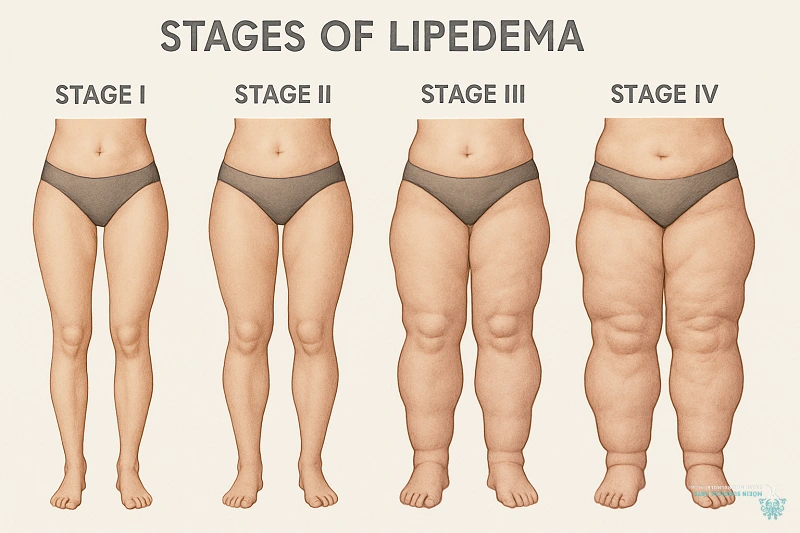Understanding Lipedema
Patients often ask, “Does insurance cover lipedema surgery?” Lipedema is a chronic disorder of subcutaneous adipose tissue marked by symmetrical, disproportionate fat accumulation in the lower extremities and sometimes the arms- commonly accompanied by pain, easy bruising, and tissue tenderness.
Diagnosis of Lipedema
A clinical lipedema diagnosis is typically made through a combination of the patient’s medical history, physical examination, imaging studies (such as ultrasound or MRI), and, in some cases, ruling out other conditions (e.g., obesity, lymphedema, or venous stasis).
Does Insurance Cover Lipedema Surgery?
Historically, lipedema surgical treatments, especially liposuction specifically targeted to lipedema fat, were considered cosmetic by many insurers. However, increasing recognition of lipedema as a medical condition has led some insurers to partially or fully cover medically necessary surgical interventions when certain criteria are met.
General Criteria for Coverage
Although specific policies vary, the following are common requirements:
Comprehensive Medical Evaluation
Evidence of Medical Necessity
Documentation that the patient experiences pain, mobility limitations, or significant functional impairment due to lipedema.
Demonstration that conservative measures (compression therapy, physical therapy, decongestive therapy, weight management) have been attempted and did not provide adequate relief.
Clinical Imaging / Objective Testing
Trial of Conservative Management
Surgical Necessity
Coverage Likelihood and Criteria by Major Insurance Carriers
Below is a general overview of some major carriers’ approaches to lipedema coverage over the past few years. Policies are subject to change, and each insurer may have multiple plans with varying stipulations. Always verify current policy documents.
United Healthcare (UHC)
- Policy Stance: United Healthcare's policy stance typically aligns with standard guidelines regarding liposuction coverage. The organization classifies liposuction as a cosmetic procedure unless there is clear evidence of medical necessity.
Aetna
Policy Stance: Historically conservative in approving coverage for lipedema surgery, often classifying it as cosmetic.
Important Criteria:
Clear documentation of medical necessity.
Proof of functional limitation and symptomatic relief is only possible through surgical intervention.
Demonstration of failure of conservative management.
Likelihood: Moderately low if presented as purely cosmetic; higher if compelling evidence of pain, limited mobility, and documented conservative therapy failure is provided.
Cigna
Policy Stance: Often requires extensive preauthorization with evidence of medical necessity.
Important Criteria:
Thorough diagnostic workup.
Letters of medical necessity from providers.
Documentation of daily life impairment.
Objective imaging or other forms of substantiation.
Likelihood: Moderate; coverage approvals have been reported, but strong supporting documentation is crucial.
Medicare (If Applicable)
Policy Stance: Medicare coverage for lipedema surgery is generally limited, as liposuction is often considered cosmetic.
Important Criteria:
Thorough evidence of medical necessity (e.g., ulcers, severe functional impairment, or other serious complications).
A strong, well-documented case linking surgery to significant health benefits.
Likelihood: Historically low, but appeals and thorough documentation might improve chances.
Blue Cross Blue Shield (BCBS)
- Policy Stance: Varies by state-affiliated BCBS entity. Some BCBS plans are beginning to acknowledge lipedema and may cover surgery when strict criteria are met.
Important Criteria:
- Documentation of lipedema-specific symptoms and functional impairments.
- Referral letters from specialists (e.g., vascular surgery, plastic surgery) confirming the necessity.
- Conservative management attempts.
Key Tips to Improve Insurance Approval Odds
Comprehensive Documentation:
Maintain detailed medical records, including photographs, imaging reports, and physical exam findings.
Keep notes on each conservative treatment attempted, outcomes, and duration.
Demonstrate Functional Impairment:
Document how lipedema impacts daily activities (e.g., difficulty walking, standing for long periods, or performing essential tasks).
Include objective assessments (e.g., range of motion tests, physical therapy evaluations).
Highlight Medical Necessity:
Emphasize chronic pain, easy bruising, recurrent infections (if any), and the potential for disease progression.
Clarify how surgical intervention would improve or stabilize the patient’s condition.
Preauthorization:
For most insurance plans, seek preauthorization or prior approval before surgery.
Submit all supporting documents and medical letters in a cohesive application.
Patient Advocacy & Appeals:
If coverage is initially denied, patients should be guided to file an appeal with additional medical evidence.
In some cases, external review boards or state insurance commissioners can be involved if appeals through the insurer’s process do not result in approval.
Summary: Does Insurance Cover Lipedema Surgery?
Lipedema is increasingly recognized as a legitimate medical condition that can impose significant physical and emotional challenges. Diagnosis primarily relies on clinical evaluation, which involves careful observation of its characteristic features while ruling out other conditions. Insurance coverage can be inconsistent, though more carriers are starting to acknowledge the need for surgical intervention for severe or treatment-resistant cases of lipedema.
When pursuing insurance coverage, it's essential to focus on comprehensive documentation, demonstrate any functional impairments, and indicate that surgical treatment is a medical necessity rather than a cosmetic procedure like vaser lipo. Given the variability in policies, checking the specific guidelines of each insurance plan is crucial.
For those considering surgical options, you can reach out to cosmetic surgeon Dr. Moein in Los Angeles at Moein Surgical Arts. They offer personalized consultations to discuss your needs. To get more information, contact them directly or call to schedule an appointment. It's vital to advocate for your health by navigating through preauthorization and appeals processes if necessary.












